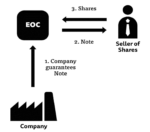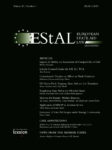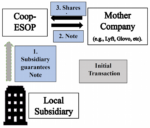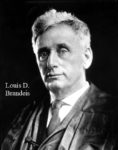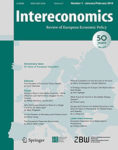This is Chapter 1 in my book: Ellerman, David. 1995. Intellectual Trespassing as a Way of Life: Essays in Philosophy, Economics, and Mathematics. Lanham MD: Rowman & Littlefield.
This first chapter addresses the problems of trespassing involved in understanding the arguments presented in the first five “controversial” chapters of the collection. These chapters challenge the whole idea of the employer-employee relationship that is the institutional basis for our present version of a private-property market economy. The problems of trespassing against fundamental orthodoxy in the social and moral sciences are of a completely different order of magnitude than the problems of trespassing in the natural and mathematical sciences.
Trespassing against the Happy Consciousness of Orthodox Economics
Talk Slides about European ESOP
These are slides from a talk about the European ESOP (Employee Stock Ownership Plan) developed by the Institute for Economic Democracy in Ljubljana, Slovenia.
Worker Cooperatives and other so-called “Cooperatives”
Most cooperative organizations today do not exemplify any cooperative activity; non-worker cooperatives do not represent any cooperative activity of the members since the only joint activity of the organization is carried out by employees. The idea that cooperatives are democratically governed does not apply to non-worker cooperatives (based on the employment relation) since the members are not choosing the managers or governors of their own activity but of the activity of the people working in the cooperative.
European ESOP
The American Employee Stock Ownership Plan or ESOP is a leveraged buyout mechanism so that the employees in a company can, in effect, do a leveraged buyout of part or eventually all of their own company. ESOP is one of the most successful and unifying models for employee ownership in the world. The purpose of this paper is to analyze the main features of the US ESOP model and to define a technical description of the European ESOP, which builds on the good features of the US model and improves the flawed features.
Marcora Law for Europe
There is a time-tested solution in Spain and Italy that provides liquidity to such enterprises in a democratic manner by establishing employee ownership schemes. The new source of liquidity is allowing unemployed workers to capitalize part of their unemployment insurance to invest in a new or existing enterprise where they will have a job.
Using ESOPs to Democratize Labor-Based Platforms
Our purpose is to propose another complementary approach, which is democratizing and adapting the Employee Stock Ownership Plan to gain co-ownership in the local subsidiaries of the labor-based platforms (LBP). This option puts a new tool in the hands of the municipal and national authorities that could regulate the platform sector.
Less-Known Supporters of Workplace Democracy
his paper, published as an editorial in the Journal for Participation and Employee Ownership collects together extensive quotations and extracts from 19th and 20th century thinkers who were little-known for being supporters of workplace democracy.
The “Ownership of the Firm” is a Myth (1975)
This paper was originally published in a journal: Ellerman, David. 1975. “The ‘Ownership of the Firm’ Is a Myth.” Administration and Society 7 (1 May): 27–42, and then we immediately reprinted in a collection of essays: Ellerman, David. 1975. “The ‘Ownership of the Firm’ Is a Myth.” In Organizational Democracy : Participation and Self-Management, edited by David Garson and Michael P. Smith. Beverly Hills CA: Sage Publications.
Towards Abolishing the Renting of Persons
This paper is a write-up of a speech given in 2017 at a centennial ‘celebration’ of the 1917 Russian Revolution at the Haus der Kunst in Munich.
COVID-19 Aid to Promote Employee Ownership
The premise of this paper is that state aid to distressed companies should benefit not only the current owners but also the employees, who are the ones taking personal risks to continue or restart companies.


